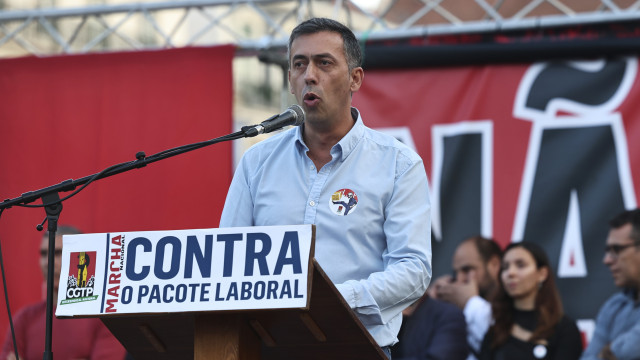The Secretary-General of CGTP, Tiago Oliveira, announced a general strike scheduled for December 11 at the conclusion of the national march against the labor package in Lisbon. Meanwhile, UGT informed that it would propose to the national secretariat to ratify the decision to proceed with the union strike on Thursday. While the Prime Minister, Luís Montenegro, deemed the strike “incomprehensible” and serving only the interests of the Portuguese Communist Party (PCP) and the Socialist Party (PS), President Marcelo Rebelo de Sousa urged restraint, stating “the procession is still at the churchyard.”
“We announced the general strike against the labor package,” said CGTP’s Secretary-General, Tiago Oliveira, in a speech at Restauradores in Lisbon, at the end of a march against the labor package announced by the Government. The official stated that “with decisions already made or in the final decision-making process by many union structures, it was possible to establish the convergence for a general strike on December 11.”
Tiago Oliveira described the labor package as “one of the biggest attacks ever made on workers,” reiterating that it comprises a slew of changes to labor legislation that, if implemented, would be a significant setback for everyone.
“There are over 100 subjects this Government wants to revise in labor legislation, all aiming to tilt employment relations in favor of employers,” he said.
UGT, in turn, will propose to the national secretariat the ratification of the decision to proceed with the strike on Thursday.
“The decision will be ratified in the national secretariat on the 13th,” confirmed an official UGT source, indicating ongoing discussions with CGTP.
The last time both union confederations called a joint general strike was over ten years ago, during the ‘troika’ period.

The Secretary-General of CGTP announced today a general strike for December 11 at the end of the national march against the labor package in Lisbon.
Lusa | 17:21 – 08/11/2025
“There is no objective reason that could trigger adherence to a general strike”
Prime Minister Luís Montenegro stated on Sunday that the general strike announced by the union structures is “incomprehensible,” asserting that it serves only to regard the interests of the PCP and the PS, which “does not reflect well” on those movements.
“Frankly, I cannot perceive any other reason for this stance by the union centrals than catering to interests that, from my perspective, should not prevail, those being the interests of the parties predominantly linked to the management of the two union centrals,” he stated.
He added, “I am referring to the Communist Party, which wants to demonstrate its presence through its union network in CGTP, and I refer to the Socialist Party, which also seeks to display its political presence of opposition, leveraging some of the preponderance it has in UGT.”
The head of the Government reiterated that the timing of the strike is “premature and even anachronistic,” given that no decree has yet been approved by the Council of Ministers.
“No one can understand it, and in my opinion, it does not reflect well on the union movement. I believe unions have everything to fulfill their role – I do not wish to impose constraints, it’s excellent that they represent the labor interests of Portuguese workers, but when the country’s reality does not align with the unions’ reality, something is wrong, and it isn’t the country,” he argued.

The Prime Minister considered today that the general strike called by CGTP and UGT is “incomprehensible,” saying it only serves to address the interests of the PCP and the PS, which “does not reflect well” on the union movement.
Lusa | 21:02 – 09/11/2025
Montenegro also pointed out, “the Government has done everything to avoid all strikes” and reiterated that, in his view, “there is no objective reason that could trigger adherence to a general strike.”
Along this line, he noted that this Government has already made “19 labor-related agreements or those pertaining to remuneration and careers” and highlighted that, in 2024, Portugal was among the 38 OECD countries “where people’s incomes rose the most.”
Asked whether the Government is open to negotiations to try to prevent this strike, Montenegro responded that the Executive “is where it always has been, available for dialogue.”
“If you tell me that the main, if not sole, topic is the drive to advance a labor law that seeks to be more employment-friendly and good employment-friendly at a time when that proposal is under social dialogue discussion, it is on the table; your question is, are we open for negotiation? […] We are negotiating, we are in the midst of negotiations, and there has not yet been approval by the Council of Ministers or submission of a proposal to the Assembly of the Republic,” he stressed.
“It’s a matter where the procession is still at the churchyard”
President Marcelo Rebelo de Sousa similarly commented on Sunday that the general strike scheduled for December 11 was set when “the procession is still at the churchyard” concerning labor package discussions.
“It makes sense to be discussed in social dialogue, it makes sense to be discussed with the parties,” thus “it’s a matter where the procession is still at the churchyard,” the head of state stated to journalists.
Marcelo highlighted that the country will wait for the process to be completed, predicting that this Government proposal “will only be discussed in Parliament at the end of this year, likely only next year.”
It should be remembered that the anticipated changes in the proposal – referred to as “Work XXI,” which the Government presented on July 24 as a “profound” revision of labor legislation – cover areas from parenthood (with changes in parental leave, breastfeeding, and gestational mourning) to flexible work, company training, or the trial period of employment contracts, also providing for an extension of sectors now covered by minimum services during a strike.
A march against the labor package organized by CGTP led thousands of workers to descend Avenida da Liberdade in Lisbon on Saturday, protesting against the proposed changes to labor laws by Luís Montenegro’s Government.




